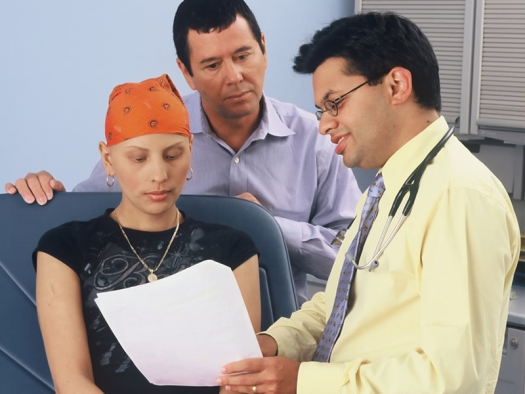CancerPatientAndDoctor.jpg

Photo by National Cancer Institute / Unsplash
Cancer. A word we all know, but that none of us are ever truly prepared to hear. While we don’t yet have a cure, scientists, researchers, and doctors across the globe are working to figure out how we can better detect, prevent and treat cancer.
And recent research has uncovered some exciting results that may just bring us one step closer to defeating this devastating disease. As it turns out, the secret to better understanding cancer may just lie in microscopic organisms known as fungi.
Today we’re going to explore this fascinating link between cancer and fungi. Let’s begin with a primer on cancer.
Cancer Defined: What Exactly Is Cancer?
In simplest terms, cancer occurs when there is an error or mutation in the instructions encoded within your cells that directs them on how to function, grow, and divide. When this “instruction manual” mutates and triggers your cell to become cancerous, it instructs your cell to grow and multiply at a much more rapid rate than normal – sometimes even triggering them to start accumulating and invading other tissues of your body.1
And what makes cancer even more tricky, is that these cancerous cells are crafty and creative – manipulating your body to enhance their survival. For example, in some instances cancerous cells can:2
- Alter blood flow: In order to enhance blood flow and the delivery of life-sustaining nutrients, cancerous cells can encourage blood vessels to extend into tumors.
- Evade immune detection: Cancer cells can bypass your immune system’s built-in defense mechanism and avoid being detected and destroyed.
- Manipulate your immune system: Cancerous cells can be master manipulators – even tricking your immune system into protecting them instead of your normal cells.
Any cell in your body can become cancerous – hence the many different types of cancer. So what causes these cells to mutate and become cancerous in the first place?
What Causes A Cell to Become Cancerous
While there is likely a multitude of factors that can contribute to a cell becoming cancerous, they all circle back to an imbalance in what’s known as your redox homeostasis. This process goes something like this:3,4
- Free radical production: As a by-product of their natural functions, your cells produce compounds known as free radicals – highly unstable and reactive molecules that can rob your healthy cells of electrons in an attempt to stabilize themselves. This stripping of electrons damages your own cells, causing what’s referred to as oxidative stress.
- Redox homeostasis: Because these free radicals are a natural and healthy part of cellular function, your body also produces compounds known as antioxidants to neutralize and remove these unstable molecules. This precise and dynamic give and take maintains a balance known as redox homeostasis.
- Redox imbalance: If this fragile equilibrium of redox homeostasis is thrown out of whack, your antioxidant system can become overwhelmed – causing a spike in free radicals that your body is unable to neutralize in a timely manner.
- Cellular dysregulation: As these free radicals are left unchecked, they wreak havoc on your cells – causing oxidative damage to your DNA, proteins, and other molecules that your cell needs. Over time, this damage alters your cell’s structure and ability to function – triggering the metabolic mutations that cause the cell to become cancerous.
- Redox reprogramming: Once cancerous, these mutated cells can manipulate redox homeostasis to enhance their survival – boosting their ability to replicate, prolonging their lifespan, and upregulating antioxidant production to shield themselves from further oxidative stress.
The underlying factors that can disrupt your redox homeostasis are countless – ranging from genetics to diet and everything in between. But there’s one potentially underlying factor that has piqued the interest of researchers and doctors – a class of organisms known as fungi. Before we dive into the fascinating link between cancer and fungi, let’s first zoom in on how fungi can cause inflammation, oxidative damage, and dysregulation of your redox homeostasis.
How Fungi Trigger Inflammation and Oxidative Damage
Fungi are a class of organisms that includes things like mushrooms, mold, and yeast. Our bodies are also inhabited by microscopic fungi that live within our gut microbiome – where they disrupt and can potentially cause your cells to go haywire and become cancerous.
Now that you have an understanding of how fungi can potentially disrupt your redox homeostasis, let’s look at what research has uncovered regarding the connection between fungal organisms and cancer.
The Mycobiome: The Link Between Fungi and Cancer
Your microbiome, or the bacteria that reside in your gut, have long been known to have a significant impact on the trajectory of countless diseases – cancer included. But your mycobiome – the conglomeration of fungi that inhabit your body – might be just as important. Let’s look at some of the fascinating and distinct links that researchers have discovered between cancer and the species of fungi that make up your mycobiome:5,6,7,8
- Fungi inhabit many cancerous tumors: Over 17,400 patient samples across 35 different types of cancer were analyzed for the presence of fungal species. Fungal DNA was detected in tumors, within cancer cells, and even inside immune cells that had infiltrated the tumor.
- Certain fungal populations correlate with specific types of cancer: Even more interestingly, the fungal ecosystems found within tumors correlated with specific types of cancer. For example, the fungal species of candida was found in higher levels in gastrointestinal cancer while the species Blastomyces was found in higher concentrations in lung cancer.
- Interactions between fungi, bacterial communities, and immune cells impact cancer outcomes: Fungi and bacteria were found to co-exist within tumors – creating a complex dynamic between fungi, bacteria, and immune cells. This complex dynamic may impact cancer outcomes – with studies suggesting that a higher fungal load may correlate to worse cancer outcomes.
- Fungi can impact cancer progression and tumor biology: Fungi were found to clearly impact the progression of cancer and tumor growth. While the exact mechanisms of action aren’t entirely clear, it’s likely due to a combination of factors such as altering the tumor microenvironment, the secretion of bioactive metabolites, the modulation of your immune system, and via communications with bacterial populations.
If fungal populations do indeed have a direct correlation to cancer development and progression, these findings could have major implications when it comes to cancer prevention, detection, and treatment.
So, Is the Mycobiome the Secret to Understanding Cancer?
The answer to this question is – it’s unclear. These discoveries are certainly exciting and give us some fresh insight into how cancer impacts our body. But more time and research is needed to truly determine the role fungi and the mycobiome play in the development and progression of cancer.
But understanding the pivotal role that the microbes that inhabit our body play in cancer brings us one step closer to finding a solution to treating cancer. And definitely gives us more insight in to how crucial it is to support a healthy, balanced, and diverse microbiome when it comes to preventing, managing, and healing conditions like cancer.
Have You Been Diagnosed With Cancer?
A cancer diagnosis can turn your entire world upside down. While we don’t have a cure for this devastating disease yet, there is hope and there are steps you can take to fight back. Whether you’re recently diagnosed, are in the trenches of radiation therapy or chemo, or are fortunate enough to be in remission, you may benefit from seeking out the guidance of an integrative and functional medicine practitioner.
There tends to be an unspoken belief that a holistic, functional medicine approach is somehow at odds with conventional treatment (like radiation and chemo). But when it comes to fighting cancer, this couldn’t be further from the truth – both approaches have a place of vital importance. Working with a Functional Medicine Doctor alongside your oncologist can help you combat cancer on every front and help you create an “anti-cancer” lifestyle.
You see, cancer is not a “one-and-done” disease. Once your cells have mutated, they are more likely to revert back to a cancerous state – even if treatment has eliminated all signs of cancer. So the best way to fight back against cancer is to take a big-picture, whole-life approach.
Ready to Create an Anti-Cancer Lifestyle?
An anti-cancer lifestyle really just means supporting your body to function at optimal capacity. It encompasses some more obvious things like eating a nutritious anti-inflammatory diet, moving your body, and getting quality sleep. But it also includes often-overlooked things like your exposure to environmental toxins (like mold and other fungi), your stress and mental well-being, your relationship with yourself and others, and more.
Whether cancer has impacted your life or not, we could all benefit from striving to live an “anti-cancer” lifestyle. So if you want to shortcut your way to a healthier, happier life, sign up for my weekly newsletter. I’ve got hundreds of free resources designed to empower you with easy-to-understand and easy-to-implement steps for a vibrantly healthy life.
And if you want to take it even deeper, you’ve got to get your hands on a copy of my new book "Unexpected: Finding Resilience Through Functional Medicine, Science, and Faith." In my book, I detail my own journey with cancer and other life-changing diagnoses as well as various challenges and obstacles throughout my life. I poured my heart and soul into this book in the hopes of offering not only a practical roadmap to better health, but also a source of inspiration. Because I know with every fiber of my being that you have the power to transform your health and your life to create vibrant well-being from the inside out. Sometimes all we need is a little nudge to help us unearth a world of unexpected miracles.
References
- What is Cancer? | Cancer Basics | American Cancer Society
- What Is Cancer? – NCI
- Frontiers | The Relationship of Redox With Hallmarks of Cancer: The Importance of Homeostasis and Context | Oncology (frontiersin.org)
- The redox biology network in cancer pathophysiology and therapeutics – ScienceDirect
- Pan-cancer analyses reveal cancer-type-specific fungal ecologies and bacteriome interactions: Cell
- The Fungus Within Us: The Mycobiome’s Emerging Role in Cancer – American Association for Cancer Research (AACR)
- Fungi and cancer | Gut (bmj.com)
- Fungi find their way into cancer tumors, but why is a mystery – STAT (statnews.com)
Cancer and Fungi: Could Mold, Yeast, and Other Fungi Play a Role in Cancer? was originally published on Dr. Jill’s website on September 26, 2023: used with permission. For information on supplements go to www.drjillhealth.com.


